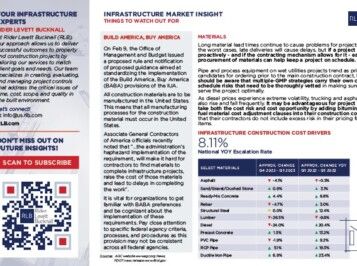Offering clients the level of certainty they need to make critical, real-time decisions to ensure the commercial success of their infrastructure projects.
Our healthcare market insights document lets industry leaders and clients know what factors to keep an eye on, whether that be Build America, Buy America, industry materials, or Infrastructure Investment & Jobs Act (IIJA). We also keep you informed on infrastructure construction cost drivers and what information like this means for the future of the sector.
We have also created a Canadian Infrastructure Market Insight document, which can be found here.
Things to watch out for
Build America, Buy America
On Feb 9, the Office of Management and Budget issued a proposed rule and notification of proposed guidance aimed at standardizing the implementation of the Build America, Buy America (BABA) provisions of the IIJA.
All construction materials are to be manufactured in the United States. This means that all manufacturing processes for the construction material must occur in the United States.
Associate General Contractors of America officials recently noted that “…the administration’s haphazard implementation of the requirement, will make it hard for contractors to find materials to complete infrastructure projects, raise the cost of those materials and lead to delays in completing the work”.
It is vital for organizations to get familiar with BABA preferences and be cognizant about the implementation of these requirements. Pay close attention to specific federal agency criteria, processes, and procedures as this provision may not be consistent across all federal agencies.
Materials
Long material lead times continue to cause problems for projects. In the worst cases, late deliveries will cause delays, but if a project plans proactively – and if the contracting mechanism allows for it – early procurement of materials can help keep a project on schedule.
Pipe and process equipment on wet utilities projects trend as prime candidates for ordering prior to the main construction contract, but Owners should be aware that multiple-GMP strategies carry their own cost and schedule risks that need to be thoroughly vetted in making sure that they serve the project optimally.
As diesel prices experience extreme volatility, trucking and asphalt costs will also rise and fall frequently. It may be advantageous for project owners to take both the cost risk and cost opportunity by adding bituminous and fuel material cost adjustment clauses into their construction contracts so that their contractors do not include excess risk in their pricing for those items.
About the charts
This chart represents the different programs with the IIJA’s $550B expenditure through 2026.

State of the Market
The bipartisan Infrastructure Investment and Jobs Act (IIJA) includes $550 billion in new expenditure through 2026, the majority of which will affect commercial real estate and sustainable infrastructure.
Since the passing of the Infrastructure and Jobs Act (IIJA – Public Law 117-58) in November 2021, the IIJA has awarded roughly $185 billion of its initial $1.25 trillion in allocated funds, with $120 billion of those funds being allocated towards roads and bridges by the end of 2022. With a shaky start to the funding of the bill and a current volatile economic climate, construction firms are beginning to see a disbursement of the funds in Q1 2023.
FURTHER INFORMATION:

Josh Marks



